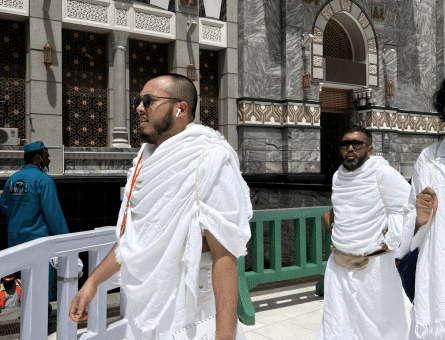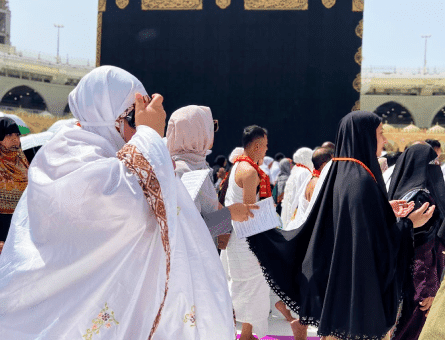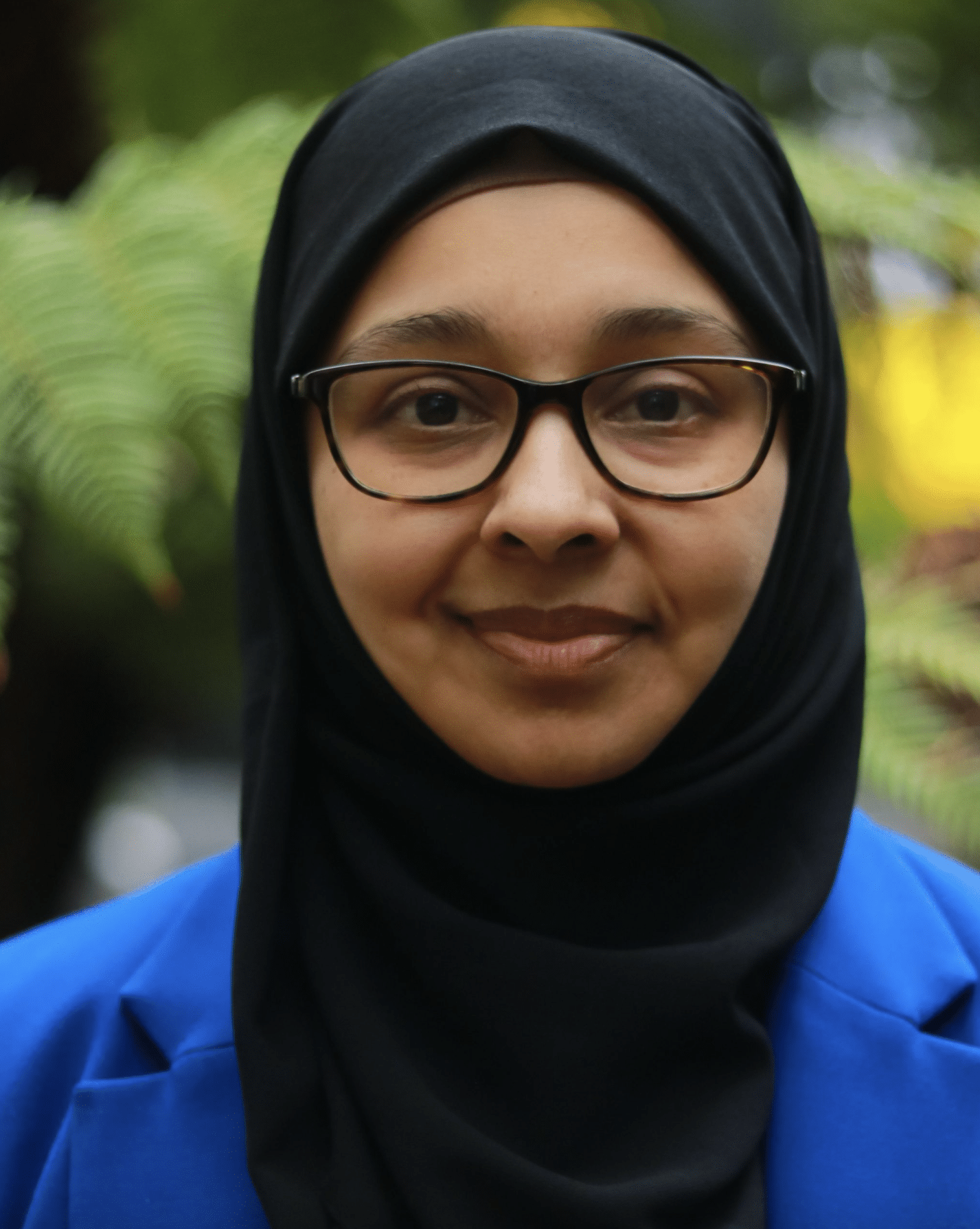Halq and Taqsir – Hajj and Umrah haircut rules for men and women
Halq and Taqsir are two important rituals, both of which must be performed upon the completion of pilgrimage (Hajj or Umrah) in Makkah, Saudi Arabia. “Halq” is the shaving of the head, and “Taqsir” refers to trimming the hair on the head by a minimum of an inch.
Performing Halq is an obligatory rite for men, whereas Taqsir is an obligation for both women and men, depending on whether one is performing Hajj or Umrah. Being acts of worship, Halq and Taqsir should be acted out with the intention of pleasing Allah SWT and leaving the state of Ihram while following the Sunnah of Prophet Muhammad (PBUH). Here is everything you need to know about Halq and Taqsir.
What is Halq and Taqsir?
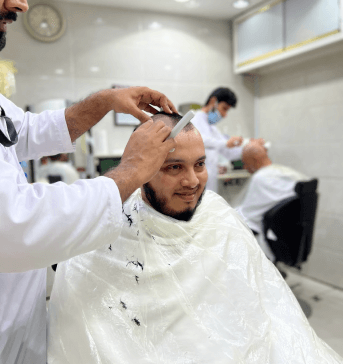 Shaving or cutting off the hair is an essential part of Hajj and Umrah. However, depending upon which obligation one is performing, rites might vary. Halq is when one shaves their entire head after the completion of Umrah and it applies exclusively to men. On the other hand, Taqsir means to trim (cut) one’s hair and is an obligation for men and women performing Umrah or Hajj.
Shaving or cutting off the hair is an essential part of Hajj and Umrah. However, depending upon which obligation one is performing, rites might vary. Halq is when one shaves their entire head after the completion of Umrah and it applies exclusively to men. On the other hand, Taqsir means to trim (cut) one’s hair and is an obligation for men and women performing Umrah or Hajj.
When going for Umrah, a pilgrim must be aware of the rules and regulations of Halq and Taqsir, the right time to perform them, the prayers (duas) that must be recited, and the recommended methods.
As stated earlier, performing Halq and Taqsir is Wajib (obligatory) if a person has hair on their head. Note that a person won’t be able to leave the state of Ihram until one of the two is performed. When performing Halq or Taqsir on your own, it is recommended that you start shaving/trimming your hair from the right side while facing the Holy Kaaba.
Anas ibn Malik (RA) narrated, “Allah’s Messenger (PBUH) came to Mina; he went to the Jamarat and threw pebbles at it, after which he went to his lodging in Mina and sacrificed the animal. He then called for a barber and, turning his right side to him, let him shave him, after which he turned his left side. He then gave (this hair) to the people.” [Narrated in Sahih Muslim]
What Is the Importance of Halq and Taqsir?
Allah SWT, on stating the significance of Halq and Taqsir, said in the Holy Quran: “Certainly Allah had shown to His Messenger the vision with truth: you shall most certainly enter the Sacred Mosque, if Allah pleases, in security, (some) having their heads shaved and (others) having their hair cut, you shall not fear, but He knows what you do not know, so He brought about a near victory before that.” (Holy Quran, Surah Al-Fath, 48:27)
It is said that soon after the revelation of the aforementioned verse, during Hajjatul-Wada, Prophet Muhammad (PBUH) had a dream in which his head was completely shaved. So he performed the Sunnah of Halq, starting from the right side of his head. Prophet Muhammad (PBUH) then supplicated once for those who performed Taqsir (trimmed their hair), whereas he invoked the mercy of Allah SWT three times more on those who performed Halq (shaved their heads). Prophet Muhammad (PBUH) said:
“O, Allah! Be merciful to those who have their heads shaved.” The people said, “O Allah’s Messenger! And (invoke Allah for) those who get their hair cut short.” Prophet Muhammad (PBUH) said, “O Allah! Be merciful to those who have their heads shaved.” The people said, “O Allah’s Messenger! And those who get their hair cut short.” The Prophet (PBUH) said (the third time), “And to those who get their hair cut short.” Nafi said that the Prophet (PBUH) had said once or twice, “O Allah! Be merciful to those who get their heads shaved,” and on the fourth time, he added, “And to those who have their hair cut short.” (Sahih Al-Bukhari)
For Umrah, pilgrims are required to perform either Halq or Taqsir to exit Ihram. While women are required to perform Taqsir only, that is, cut their hair by the length of a fingertip, men are advised to shave their heads. However, men can perform Taqsir as well.
The acts of Halq and Taqsir stem from the idea that a person’s hair is associated with their looks and the need to keep up with worldly needs. Therefore by shaving or trimming their hair, one disconnects themselves from earthly desires, committing to follow the path of Allah SWT.
What Does “Halq” Mean in English?
“Halq” is an Arabic word that means shaving (or cutting) of hair. Halq in English refers to shaving the entire head using a razor.
What Does “Taqsir” Mean in English?
Derived from the Arabic word al-Qasr, “Taqsir” means to shorten. Taqsir can be defined as the act of trimming or cutting some of the hair on one’s head, by at least an inch.
Is It Mandatory for a Man to Shave His Head after Hajj?
 Although it isn’t mandatory for a man to perform Halq (shave his head) after Hajj, it is recommended. However, if you do not wish to cut off all your hair, one must perform Taqsir (trimming of the hair) as it is a Sunnah. Some rules and regulations related to performing Halq and Taqsir are as follows:
Although it isn’t mandatory for a man to perform Halq (shave his head) after Hajj, it is recommended. However, if you do not wish to cut off all your hair, one must perform Taqsir (trimming of the hair) as it is a Sunnah. Some rules and regulations related to performing Halq and Taqsir are as follows:
- When shaving one’s hair, make sure that the head is completely shaved, as partial shaving isn’t acceptable.
- If one is bald, to begin with, one must still use a razor to complete the ritual.
- While performing Halq, remember to face the Qibla and start shaving from the right side.
Why Do Males Shave Their Hair at the End of Hajj?
The shaving of hair at the end of Hajj (formerly known as Halq) is a sign of rebirth, both spiritually and physically. While performing Halq, a person aims to disconnect themselves from the temporary amusements of the world, while aiming to follow the command of Allah SWT and Sunnah of Prophet Muhammad (PBUH) for the rest of their lives.
Does a Woman Have to Shave Her Head after Hajj?
No. It is not permissible for women to shave their heads after Hajj. This can be proved by the following Hadith narrated by Prophet Ali (RA): “The Messenger of Allah (PBUH) forbade women to shave their heads.” [Narrated in Sunan an-Nasa’i]
How Much Hair Does a Woman Need to Trim?
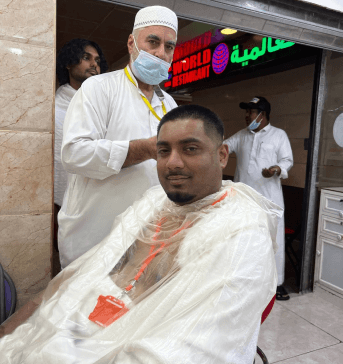 The Umrah haircut rules for women are slightly different from those that apply to men. The Taqsir (hair trimming) rules and regulations for women are as follows:
The Umrah haircut rules for women are slightly different from those that apply to men. The Taqsir (hair trimming) rules and regulations for women are as follows:
- Even if a woman has short hair, she must trim her hair to the minimum length of her fingertip to complete the Umrah and exit the state of Ihram.
- The fingertip’s length here equals to at least an inch.
- She must remember to complete the Taqsir after completing the Sai for Umrah.
- Women in the state of menstruation can also cut their own hair.
Halq and Taqsir Rules for Hajj and Umrah
A pilgrim has the complete right to choose between the acts of Halq and Taqsir. Here are some haircut rules of Halq and Taqsir with reference to different scenarios:
- Umrah Out of Hajj Season
In Umrah, Halq and Taqsir are performed after the completion of Sai, which entails running between the mountains of Safa and Marwa seven times.
- Hajj al-Tamattu
If one is performing Hajj for the first time, they are obligated to perform Halq or Taqsir after Hady, which entails sacrificing an animal in the name of Allah SWT. In contrast, women must perform Taqsir. Halq is considered more virtuous than Taqsir for men. Rasulullah shaved his hair when he performed Hajj. Rasulullah made Du’a three times for those who shaved their hair and made Du’a once for those who trimmed their hair. (Mishkaat, pg 232 Thanvi)
According to the Hanafis the necessary amount of hair (for Halq and Qasr) that should be removed is 1/4th of the head. But the entire head is better and more virtuous. The Shafi’i ruling is that cutting three strands of hair is sufficient, at a minimum length of one fingertip.
- Hajj al-Qiran
Hajj al-Qiran is when a pilgrim performs Hajj and Umrah together with only one Ihram and intention (Niyyat) for both. For those performing Hajj al-Qiran, remember that Halq and Taqsir are performed only after Hady has been completed.
During Hajj al-Qiran, one does not perform Halq or Taqsir but remain in the state of Ihram between Umrah and Hajj till it is relinquished on Yawm al-Nahr
- Hajj al-Ifrad
Hajj al-Ifrad refers to making one Niyyat for the sole purpose of performing Hajj without Umrah. During Hall al-Ifrad, Halq and Taqsir should only be performed once after Rami (pelting of the Jamarat al-Aqaba.)
Regardless of which type of Hajj you intend to go on, make sure that Halq and Taqsir are performed before the sunset of the 12th Dhul Hajjah because if there is a delay, you will be required to pay the penalty. Even though pilgrims can get their hair cut from anywhere in Makkah, Muzdalifah, and Mina, it is a Sunnah to perform Halq and Taqsir within the boundaries of Mina.
Halq and Taqsir Mention in Hadiths
Mufassir Ismail Ibn Kathir narrates, “In a dream, the Messenger of Allah (PBUH) saw himself entering Makkah and performing Tawaf around the House. He told his companions about this dream when he was still in Madinah…some of them indeed had their head hair shaved, while some of them had their head hair shortened.”
Abdullah ibn Umar (RA), in another instance, said that, “Allah’s Messenger (PBUH) forbade Al-Qaza (leaving a tuft of hair here and there after shaving one’s head).” (Sahih Al-Bukhari)
Sunan an-Nasa’i narrated that Hazrat Ali (RA) said, “The Messenger of Allah (PBUH) forbade women to shave their heads.”
Abdullah Ibn Umar narrated, “Allah’s Messenger (PBUH) said, “O Allah! Be merciful to those who have their head shaved.” The people said, “O Allah’s Messenger! And (invoke Allah for) those who get their hair cut short.” The Prophet (PBUH) said, “O Allah! Be merciful to those who have their head shaved.” The people said, “O Allah’s Messenger! And those who get their hair cut short.” The Prophet PBUH) said (the third time), “And to those who get their hair cut short.” Nafi said that the Prophet (PBUH) had said once or twice, “O Allah! Be merciful to those who get their head shaved,” and on the fourth time, he added, “And to those who have their hair cut short.” (Sahih Al-Bukhari)
Allah SWT in the Holy Quran says, “Certainly Allah had shown to His Messenger the vision with truth: you shall most certainly enter the Sacred Mosque, if Allah pleases, in security, (some) having their heads shaved and (others) having their hair cut, you shall not fear, but He knows what you do not know, so He brought about a near victory before that.” (Holy Quran, Surah Al-Fath, 48:27)
According to some Islamic scholars, the Quranic verse, “Then let them do away with their untidiness” (22:29) refers to Halq and Taqsir.
Summary – Halq and Taqsir
Halq and Taqsir are two meaningful ceremonies that an individual must perform upon the completion of Hajj or Umrah. Halq is the act of completely shaving your head and is only applicable to men. On the other hand, Taqsir is the act of trimming the hair, which applies to women who are performing Umrah. Conducting the acts of Halq and Taqsir creates a spiritual bond with Allah SWT as it signifies one’s detachment from the materialistic world.
Therefore, when you are going on pilgrimage, it is advised to be aware of the key Hajj and Umrah principles and perform the rituals with utmost devotion and honesty to Allah SWT while complying with the Sunnah of Prophet Muhammad (PBUH) and the guidance of Islamic scholars.
Explore The New Pilgrim App
The Ultimate App
for Hajj and Umrah!










